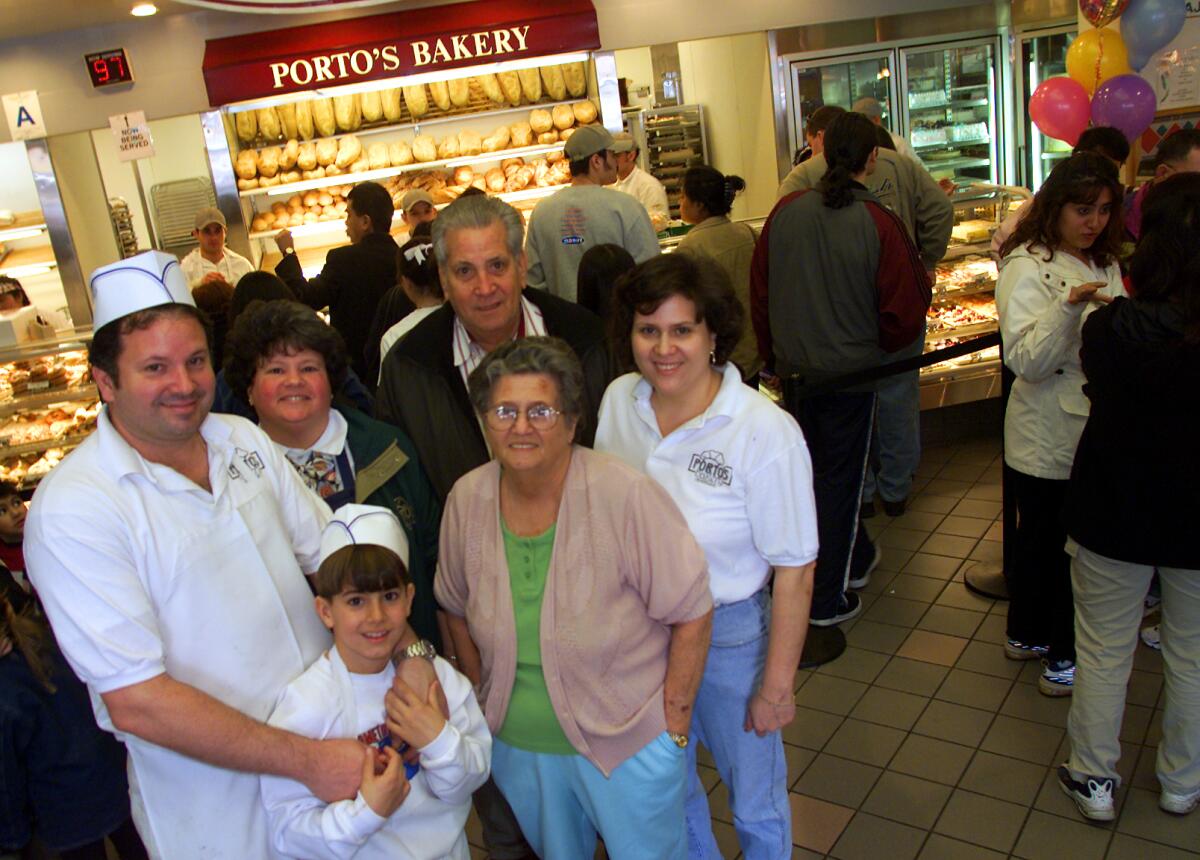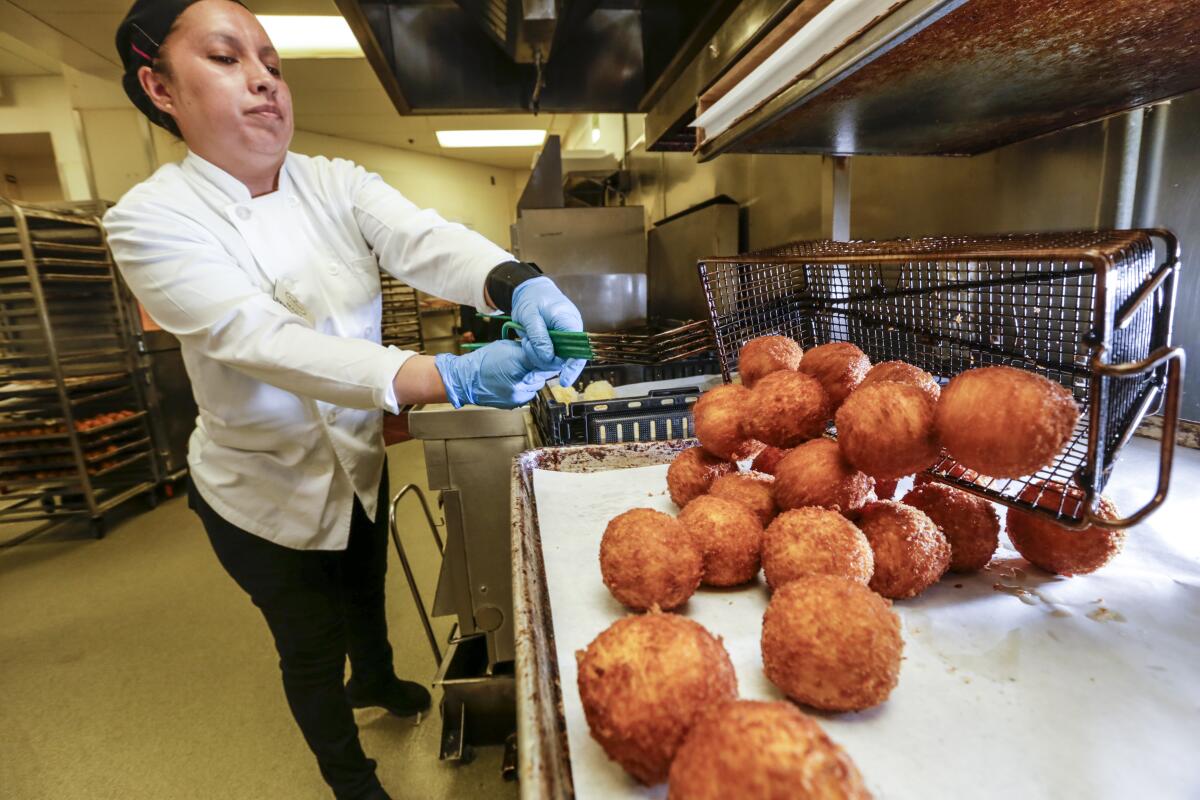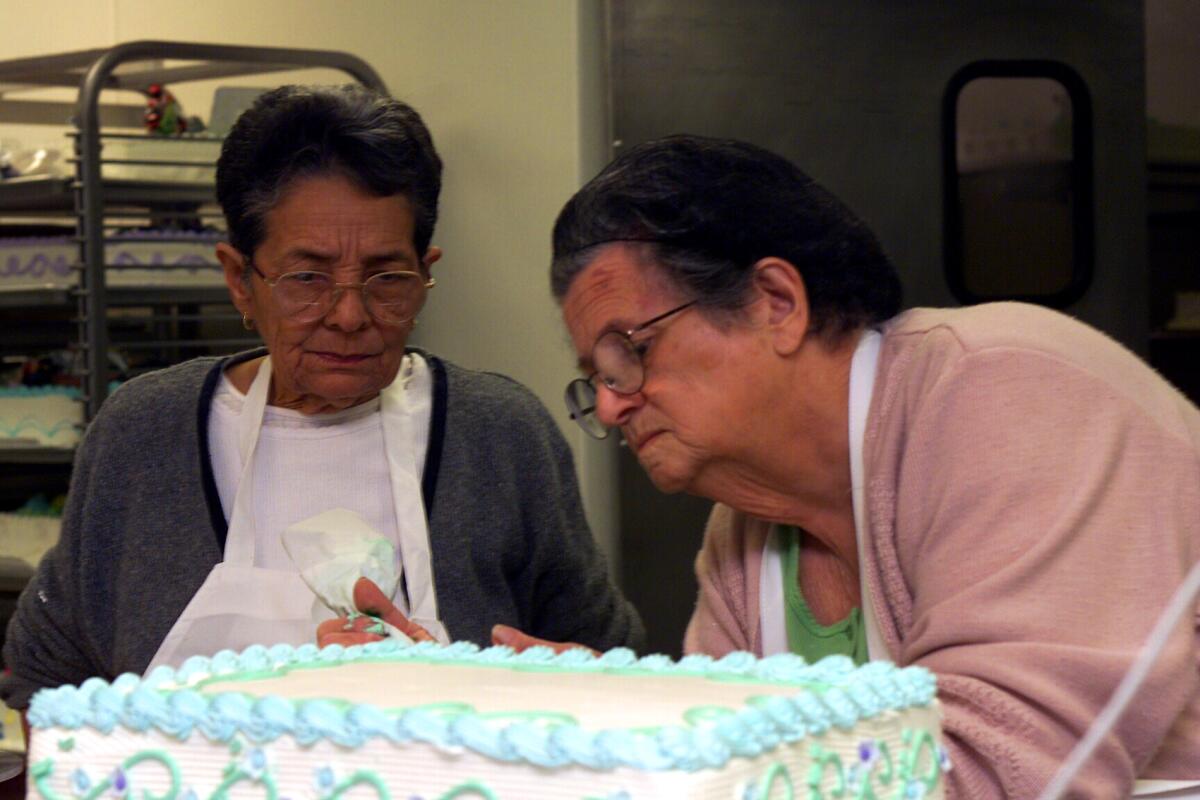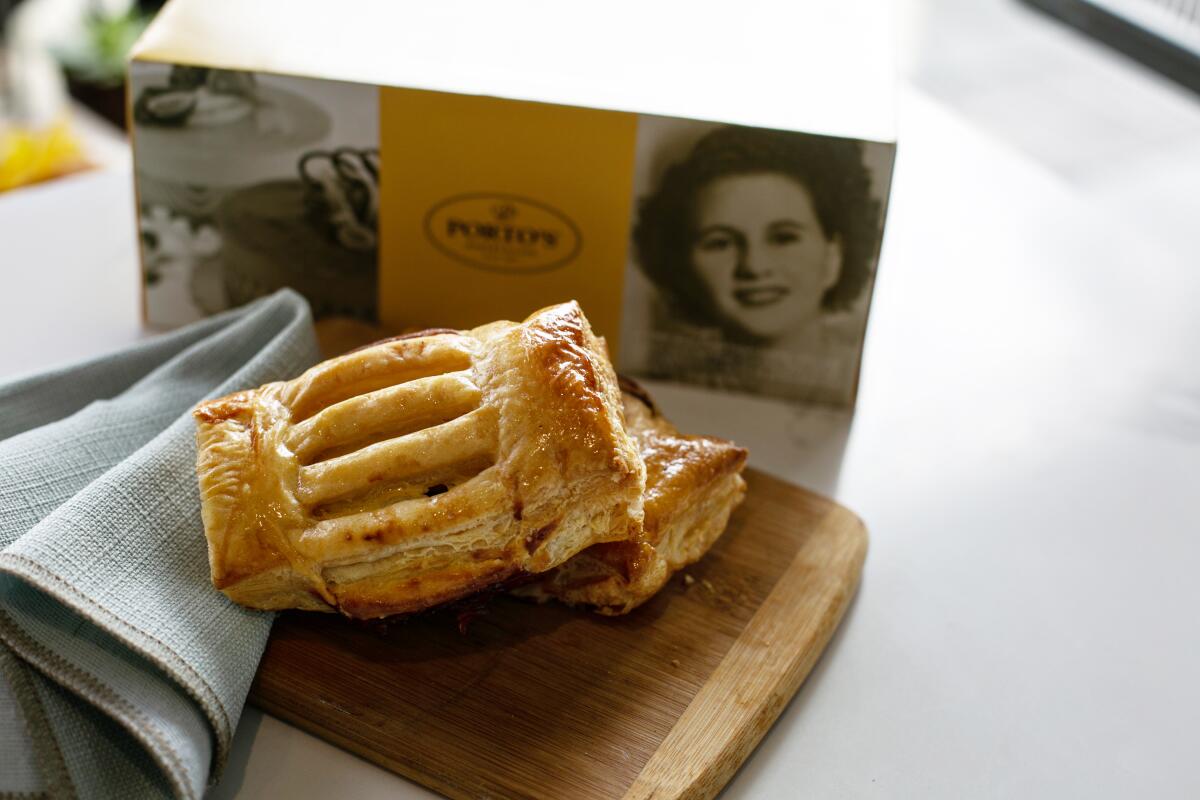How Rosa Porto created the most beloved bakery in all of Los Angeles

- Share via
The potato ball is as good a place as any to start when talking about Porto’s. They are divine racquetball-sized orbs of fluffy mashed potato filled with a picadillo spiced meat mixture laced with onions, peppers and what tastes like just a hint of olive and cumin. The balls are coated in breadcrumbs and fried to a deep, tawny brown. The mild crunch of the exterior yields to the silky potato-y mass, only to reward further with tender meat and mild gravy. To eat one is to truly grasp the concept of positive reinforcement in behavioral psychology. To eat one is to see the potential of what shepherd’s pie could have been. They are worth every penny of the $1.09 they cost. They are perfect.
Rosa Porto died Friday, leaving behind a husband of 64 years, children, grandchildren and legions of customers loyal to the business she created, Porto’s Bakery & Cafe. Porto, who had started an illegal cakes business in Castro-era Cuba to make money for her family while waiting for the opportunity to come to the U.S., grew her life’s work into what became far more than just a Cuban bakery. Porto’s adapted to its environs over the years — changing Los Angeles demographics and a dwindling Cuban population — and shifted its menu constantly according to evolving tastes. In doing so, the small bakery that began at Sunset and Silver Lake Boulevards in 1976 became the quintessential L.A. restaurant — and an incredible story of American success.
The first thing you’ll notice at any Porto’s, at nearly any time of day, is the chaos. Dining room packed, food runners dodging those lurking to nab the first empty table, and of course, the impossibly long line, 40 or 50 deep. The Saturday-at-Disneyland-like crowds and long queues of people waiting to get pastries, sandwiches and snacks can be off-putting to the uninitiated, certainly. But when you know, you know. Because the second thing you notice at any Porto’s is how quickly the line moves.
“What’s your name?” a young man behind the counter asks after I place my order. “I’ll meet you over at the register,” he says and disappears into a sea of two-dozen fellow employees, all balancing cardboard boxes stuffed with potato balls, chorizo pies and spinach feta pastries. I wave goodbye, like he’s someone going off to war — surely I’ll never see this person again. But he finds me somehow, and I pay and get my food, and it’s soon thereafter that the third and most important realization about Porto’s hits you: it all tastes really good.

A menu as vast as that at Porto’s — more than 100 bakery items, and dozens of sandwiches, soups and salads — would be worrisome at most places. To make an analogue, the pan-Asian bistro that serves Thai food and Chinese food and sushi never does much of it well. But at Porto’s, the usual rules don’t apply. Whether it’s the flaky croissants or the cheesecake or the Cuban sandwiches, it’s all delicious, nearly without exception. Instead of narrowly specializing, Porto’s tries to be all things to all people — and, largely, it succeeds.
But does that explain the lines? The feverish civic loyalty to a Cuban-ish bakery with just five retail locations? Does it explain the travelers jamming the distinctive yellow-and-brown boxes full of goodies into overhead compartments on flights out of L.A. to bring to out-of-state relatives?
I spoke with Rosa Porto in her home in October, along with her daughter, Margarita Navarro.
“I lived with an aunt who liked to do cakes and pastries,” Porto said in Spanish, recalling her early memories of food. She lived with the aunt for several years after her father died at a young age. These memories, and recipes from her grandmother, would inspire her once she began her own business.
After attending boarding school in Havana as a teenager, Porto returned to her hometown of Manzanillo. When I asked her if owning a bakery had been a lifelong dream of hers, she laughed and said, “No. I worked in an office! Before Fidel. At a cigar warehouse.”
After the Cuban Revolution, “Everything changed,” she said. “When you requested to leave, they fired you from your job.” Families that asked to leave the country were marked as enemies of the state — they were called worms, or traitors to the revolution. People lost their jobs, possessions and some, like Porto’s brother, perished in work camps. “You lived in a little bit of fear,” she said. “Because there were neighborhood committees.” These “committees” rooted out possible subversion — subversion like owning an illegal business.
Porto’s daughter chimed in. “When you tell them you’re leaving, they come to your house, they take inventory of everything,” Navarro said, to make sure you don’t sell anything or try to take it with you. “The moment the government took over, your house and everything in it does not belong to you.”
In the early 1960s, after the family formally applied to leave Cuba, a neighbor approached Porto, now married with a young family, and asked her to make a wedding cake. “It was either custard or guava,” Porto said. Whatever it was, it was a hit. “After that, more orders began to come in.”
“As business grew,” she said, “people started asking for more. And I got recipes for pasteles; meat and chicken from a local baker.” Ingredients, which were hard to come by under the Castro regime, had to be bartered for. She operated for years, hiding in plain sight, dodging inspections and slowly building a clientele. Her one concern was to avoid being the subject of neighborhood gossip. “Que me denunciaran,” she said: That she would be ratted out for her underground cakes business. It never happened.
Between 1965 and 1973, Freedom Flights brought hundreds of thousands of Cuban refugees to the shores of the United States. In 1971, it was the Portos’ turn. They relocated to California, where her husband, Raúl, had family. It didn’t take long for Cuban immigrants in the States to start asking Porto for her cakes. “In the airport when we arrived,” she said, she was approached by someone from home.

“In the beginning,” Porto said, “we made bread.” Porto and her husband (who worked the night shift at the now-defunct Van de Kamp’s bakery), opened their first bakery in a strip mall in Silver Lake with a bank loan. They knew they’d have to sell more than the cakes Porto had been baking in Cuba. To build up day-to-day business and foot traffic, they started selling Mexican conchas, doughnuts — whatever people wanted.
“We made Mexican bread because that was the neighborhood,” Navarro said. “We started changing based on whatever the clientele demanded. When we moved to the Glendale area, we started adding danishes and muffins.”
The Cuban population, which had supported the Portos for years, had begun to slowly diminish. “In the beginning there were a lot,” Porto said. “But the Cubans started moving. And now there are lots of Filipinos, Salvadorans.”
The small menu spiraled out wider and wider, embracing the diversity of the community. “We realized that the more product we added only pulled in more people,” Navarro said. “We were developing our recipes. We found that Filipinos loved mango mousse as well as Cubans. … The Chinese loved the strawberry shortcake. Fruit tarts became popular in the ’80s. We were always looking and researching.”
Constantly evolving, according to Porto, was the plan from the beginning. “Oh, yes. That was the idea,” she said.
On a recent weekend afternoon at the flagship Glendale location, Porto’s was packed as usual, cranking through freshly-squeezed orange juice, cafés con leche and medianoche sandwiches. Brenda Sanchez, 19, who came with her mother from Canoga Park, sang the praises of Porto’s cupcakes and empanadas. “Porto’s is not like any other place,” she said, before quickly adding, “I love my mom’s cooking! But we’re Mexican; it’s different.”
Nana Otuzbiryan, 44, a pharmacist from Glendale, was patiently queued up at the end of the bakery line. “We like the taste here. It’s different than our culture,” said Otuzbiryan, who is Armenian. “There are pastries and stuff like guava that we don’t have.”
The guava cheese strudels, or Refugiados (“refugees”) are probably the next logical step in any visit to Porto’s, after the potato balls. Flaky pastry, as light and buttery as any viennoiserie in the city, shelters a mixture of tangy, soft cheese combined with the bright, tart fruit. It’s a Caribbean-meets-Continental-Europe mashup that makes Girl Talk look like a rank amateur.
Much of the innovation that’s been done at Porto’s has happened under the watch of Antonio Salazar, vice president of production and R&D, who’s been with Porto’s since 1977. Salazar’s family knew the Portos from back in Manzanillo. “We were very limited in the scope of what we were making back in those days,” he said. “Our focus was to make the best Cuban product possible. But as the market started changing, we realized some of the Cubans were going back to Miami and slowly we started saying, ‘We should really try to sell something else.’ And so we started coming up with little ideas and making things that were not truly Cuban.”

It started with a French bread here, a chocolate mousse there, and experimenting with the formats of the cakes. “We wanted to be welcoming to everyone,” he said. “We didn’t want to just be called this Cuban bakery — not that we’re not proud to be Cuban.” By listening intently to feedback from their increasingly non-Cuban clientele, Porto’s began building loyalty that would endure throughout the decades, even if it meant making something totally foreign to them.
“We tried to make it well and if we liked it, we thought, ‘Why not?’” Salazar said. “We were making biscotti. We made scones. People thought we were crazy. We were making pastrami sandwiches up until a few years ago.” Salazar emphasizes that much of the menu still has a strong Hispanic feel to it. “We never lost that, but due to the fact that we live in L.A. we make a lot of different things. It kind of makes it exciting.”
The Cuban sandwich, served with plantain chips, is probably the third thing I would recommend to any first-timer at Porto’s. Two halves of a Cuban, cut diagonally, come to dagger-like points on opposite ends, like guillotine blades. The thin, pressed sandwich, on crusty, weightless Cuban bread, houses thin striations of pork, ham, cheese and pickles. The nutty cheese stretches satisfyingly upon first bite; the acidity of the pickles cuts the fat of the meat and a lash of mustard clears your sinuses. It is the Russell Westbrook of sandwiches: not as flashy as some, but can’t really be improved upon in any significant way.
Rosa Porto may be gone, but her legacy will surely endure. Not merely for the good food, but for the open embrace of a city and country that welcomed her in return. Instead of turning inward, Porto looked to her new city for guidance. And when she saw the neighborhoods morphing and evolving, so did she. “We came and we melted into the pot,” said Navarro. “We kept our Cuban traditions at home but we were open to the community.”
Porto was modest when I asked what she wished for the future of her business. “That my grandchildren keep the business going,” she said. And any secrets to her success? “A little luck,” she said. “And hard work.”
More to Read
Eat your way across L.A.
Get our weekly Tasting Notes newsletter for reviews, news and more.
You may occasionally receive promotional content from the Los Angeles Times.











